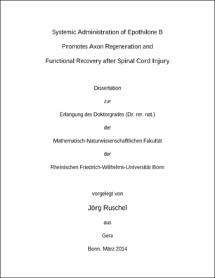Systemic Administration of Epothilone B Promotes Axon Regeneration and Functional Recovery after Spinal Cord Injury

Systemic Administration of Epothilone B Promotes Axon Regeneration and Functional Recovery after Spinal Cord Injury

| dc.contributor.advisor | Bradke, Frank | |
| dc.contributor.author | Ruschel, Jörg | |
| dc.date.accessioned | 2020-04-19T23:23:21Z | |
| dc.date.available | 2020-04-19T23:23:21Z | |
| dc.date.issued | 07.07.2014 | |
| dc.identifier.uri | https://hdl.handle.net/20.500.11811/6115 | |
| dc.description.abstract | After central nervous system (CNS) injury, such as a traumatic spinal cord injury (SCI), damaged axons fail to regenerate resulting in a permanent loss of sensorimotor functions. Regeneration is prevented by growth inhibitory factors in the lesion scar and in CNS myelin as well as by a poor axon intrinsic growth potential. Microtubule dynamics regulate key processes that are instrumental in regeneration including axon growth and scar formation. Moderate microtubule stabilization by the anti-cancer drug Taxol promotes axon integrity and axons growth and prevents the formation of the lesion scar leading to enhanced axon regeneration after SCI. However, Taxol is impractical for clinical situations. Due its poor blood-brain-barrier permeability Taxol requires CNS invasive delivery bearing the risk of additional neuronal tissue damage. Here, I report that systemic and post-injury administration of epothilone B, a microtubule stabilizing drug that crosses the blood-brain barrier, has beneficial effects after SCI. Systemic administration of epothilone B decreases fibrotic scarring in spinal cord injured rodents by disrupting cell polarity of meningeal fibroblasts, which abrogates directed cell migration. Time lapse microscopy and in vivo live imaging of individual axons reveal that epothilone B allows the microtubular network to protrude into the distal tip of the axon to propel axon growth through an otherwise inhibitory environment. Finally, epothilone B improves gait and coordinated walking after thoracic spinal cord contusion injury. As the epothilone B derivative ixabepilone received clinical approval, these data suggest that epothilones hold promise for clinical translation in enabling axon regeneration and functional recovery after central nervous system injury. | |
| dc.language.iso | eng | |
| dc.rights | In Copyright | |
| dc.rights.uri | http://rightsstatements.org/vocab/InC/1.0/ | |
| dc.subject.ddc | 570 Biowissenschaften, Biologie | |
| dc.subject.ddc | 610 Medizin, Gesundheit | |
| dc.title | Systemic Administration of Epothilone B Promotes Axon Regeneration and Functional Recovery after Spinal Cord Injury | |
| dc.type | Dissertation oder Habilitation | |
| dc.publisher.name | Universitäts- und Landesbibliothek Bonn | |
| dc.publisher.location | Bonn | |
| dc.rights.accessRights | openAccess | |
| dc.identifier.urn | https://nbn-resolving.org/urn:nbn:de:hbz:5n-36551 | |
| ulbbn.pubtype | Erstveröffentlichung | |
| ulbbnediss.affiliation.name | Rheinische Friedrich-Wilhelms-Universität Bonn | |
| ulbbnediss.affiliation.location | Bonn | |
| ulbbnediss.thesis.level | Dissertation | |
| ulbbnediss.dissID | 3655 | |
| ulbbnediss.date.accepted | 17.06.2014 | |
| ulbbnediss.institute | Angegliederte Institute, verbundene wissenschaftliche Einrichtungen : Stiftung caesar | |
| ulbbnediss.fakultaet | Mathematisch-Naturwissenschaftliche Fakultät | |
| dc.contributor.coReferee | Witke, Walter |
Dateien zu dieser Ressource
Das Dokument erscheint in:
-
E-Dissertationen (4074)




